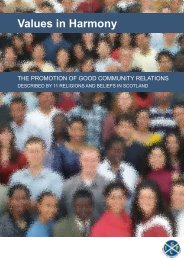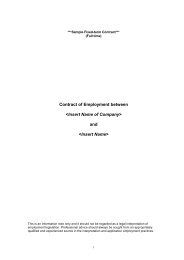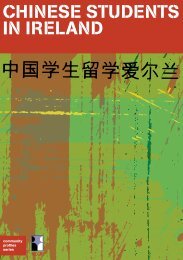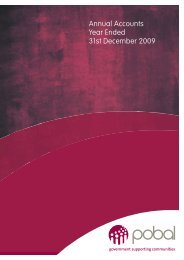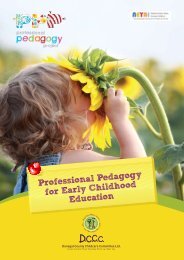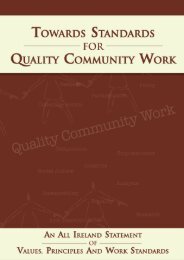Intercultural Education in the Post-Primary School - National Council ...
Intercultural Education in the Post-Primary School - National Council ...
Intercultural Education in the Post-Primary School - National Council ...
Create successful ePaper yourself
Turn your PDF publications into a flip-book with our unique Google optimized e-Paper software.
ASSESSMENT AND CULTURAL DIVERSITY 7Guidel<strong>in</strong>es for sett<strong>in</strong>g homework andassessment questions• Keep questions as short and simple aspossible.• Avoid <strong>the</strong> unnecessary use of metaphorsor colloquialisms.• Where possible provide visual clues toshow students what to do.• Provide support to students whose firstlanguage is not English. For example,teachers can set questions and <strong>the</strong>n canprovide a set of words and phrases tochoose from. Multiple choice questionscan also be useful <strong>in</strong> this regard, althoughcare should be taken as students fromano<strong>the</strong>r education system may not befamiliar with this method of assessment.• Familiarise students with <strong>the</strong> structureand vocabulary of <strong>the</strong> tests andexam<strong>in</strong>ations. Expla<strong>in</strong> commonly usedwords such as ‘identify’, ‘describe’, ‘list’,‘discuss’.• Teach <strong>the</strong> students how to take <strong>the</strong> test byprovid<strong>in</strong>g practice questions that are notscored. Give feedback on <strong>the</strong> practicequestions.• Do not ask <strong>the</strong> students to attempt <strong>the</strong>whole test paper at once. Break it up <strong>in</strong>tomanageable bites. It is less <strong>in</strong>timidat<strong>in</strong>g ifstudents are faced with one section at atime.• Avoid references to culturally specific andcontextual knowledge that some studentsmay not share.• Encourage second-language learners touse dictionaries.• Allow sufficient time for students tocomplete <strong>the</strong> exam<strong>in</strong>ation.THE ROLE OF SCHOOLS IN PROMOTINGPOSITIVE ASSESSMENT METHODS<strong>School</strong>s have a role to play <strong>in</strong> reduc<strong>in</strong>g<strong>in</strong>equality and bias <strong>in</strong> assessment andpromot<strong>in</strong>g <strong>the</strong> use of more <strong>in</strong>clusivemodels of assessment.• As part of its overall school plan,schools can set out clearly its policy andprovision for redress<strong>in</strong>g problems ofdisadvantage and <strong>in</strong>equality throughschool-based assessment. This might<strong>in</strong>clude provision of dictionaries forschool exam<strong>in</strong>ation purposes, allow<strong>in</strong>gextra time for students for whomEnglish is not <strong>the</strong>ir first language.• Secondly, <strong>the</strong>y can broaden <strong>the</strong> range ofassessment tools to facilitate differentcultures, backgrounds and <strong>in</strong>telligencesand to assist students to demonstrate adiversity of skills, aptitudes andachievements.• Thirdly, <strong>the</strong>y can have a clear policy for<strong>the</strong> regular assessment of pupils with aview to identify<strong>in</strong>g at <strong>the</strong> earliestpossible po<strong>in</strong>t, those pupils <strong>in</strong> need ofextra help.• F<strong>in</strong>ally, <strong>the</strong>y can work closely withparents to develop a real partnershipand so enhance each student’s potentialfor success.ASSESSMENT OF STUDENTS UPON ENTRYTO SCHOOLIn order to ga<strong>in</strong> sufficient <strong>in</strong>formation tosupport <strong>the</strong> student’s learn<strong>in</strong>g, it may beappropriate to assess some students uponentry <strong>in</strong>to <strong>the</strong> school. For example,students who have recently arrived fromano<strong>the</strong>r country, or students for whomEnglish is not a first language, may benefitfrom <strong>the</strong> tailor<strong>in</strong>g of education experiencesthat might stem from such assessment. Indecid<strong>in</strong>g which students to assess on entryto school, it is important that teacherjudgement be used <strong>in</strong> consultation with <strong>the</strong>parents, and hav<strong>in</strong>g regard to:• <strong>the</strong> <strong>in</strong>appropriateness and potentiallabell<strong>in</strong>g of students that might resultfrom assess<strong>in</strong>g all children fromm<strong>in</strong>ority ethnic groups who attend <strong>the</strong>school;<strong>Intercultural</strong> <strong>Education</strong> <strong>in</strong> <strong>the</strong> <strong>Post</strong>-<strong>Primary</strong> <strong>School</strong> 99




